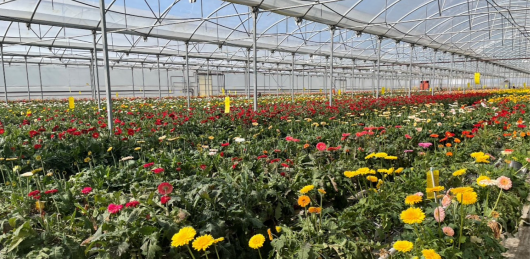
Set against the backdrop of sunny Lisbon, Portugal’s capital, the Ornamental Horticulture in Portugal Conference welcomed academic experts and industry professionals to speak about the opportunities the country offers and the challenges it faces.
The conference, which took place on 14th March, was organised by the International Association of Horticultural Producers (AIPH) in collaboration with the Portuguese Association of Producers of Natural Plants and Flowers (APPP-FN) and sponsored by GLOBALG.A.P. It was a part of the AIPH Spring Meeting where members come together from around the world.
Ricardo Silvestre, Vice-President of APPP-FN, opened the conference with an overview of the association’s work. He said: “One of the major aims of APPP-FN is to promote dialogue among professionals, institutions, and society, in order to make Portuguese ornamental production more competitive.”
Portugal has a long history with flowers, with Montijo – a region close to Lisbon – being the heart of flower production in the country. Ricardo highlighted that changes in EU legislation regarding plant health is a big issue for Portuguese growers as it is difficult to keep up-to-date.
Miguel Costa, a researcher and lecturer at the University of Lisbon, gave a comprehensive overview of the ornamental horticultural industry in Portugal. Miguel commented: “We are a small country, but we are the 8th top producer of ornamentals in Europe.”
With his research focusing on sustainability and climate issues in viticulture and horticulture, Miguel has a vast knowledge of the benefits and challenges of Portugal’s environment for growers. He said: “We have two types of climate. In the north, there are cooler temperatures and wet, rainy winters, and in the south there is less precipitation. It’s a small country but with a lot of variation.”
Ornamentals are produced close to consumer centres, such as Lisbon, and along the Atlantic coast where there are more moderate temperatures. The most produced cut flower in the country is the protea.
Rick van Woudenberg, Co-Owner of Van Woudenberg Tuinplanten, offered a different perspective on growing in Portugal. As a Dutch native who expanded his family business to a new country, Rick sees Portugal as a prime investment for the horticultural industry.
“Twelve years ago, in the Netherlands, we grew early spring perennials in greenhouses,” Rick said. “The greenhouses give very soft-flowering plants and I thought ‘we have to do this differently, we have to give the customers the choice of a hardy plant.’ From then on, we learned how to produce our perennials in Portugal.”
The Portuguese climate allows companies like Van Woudenberg Tuinplanten to produce all year round, therefore meeting seasonal demands with greater ease.
Sarah von Fintel, Key Account Manager for Floriculture Sales and Stakeholder Relations for GLOBALG.A.P., also joined the conference to inform guests about the organisation’s certification schemes and how they benefit growers. Around 2,500 ornamentals producers around the world are GLOBALG.A.P. certified, including growers in Portugal.
Commenting on the event, AIPH Secretary General, Tim Briercliffe said: “This conference and the nursery tours near Lisbon gave us a valuable insight into the Portuguese industry. There are most definitely opportunities for growth here as production becomes much less financially viable in other higher cost regions of Europe.”